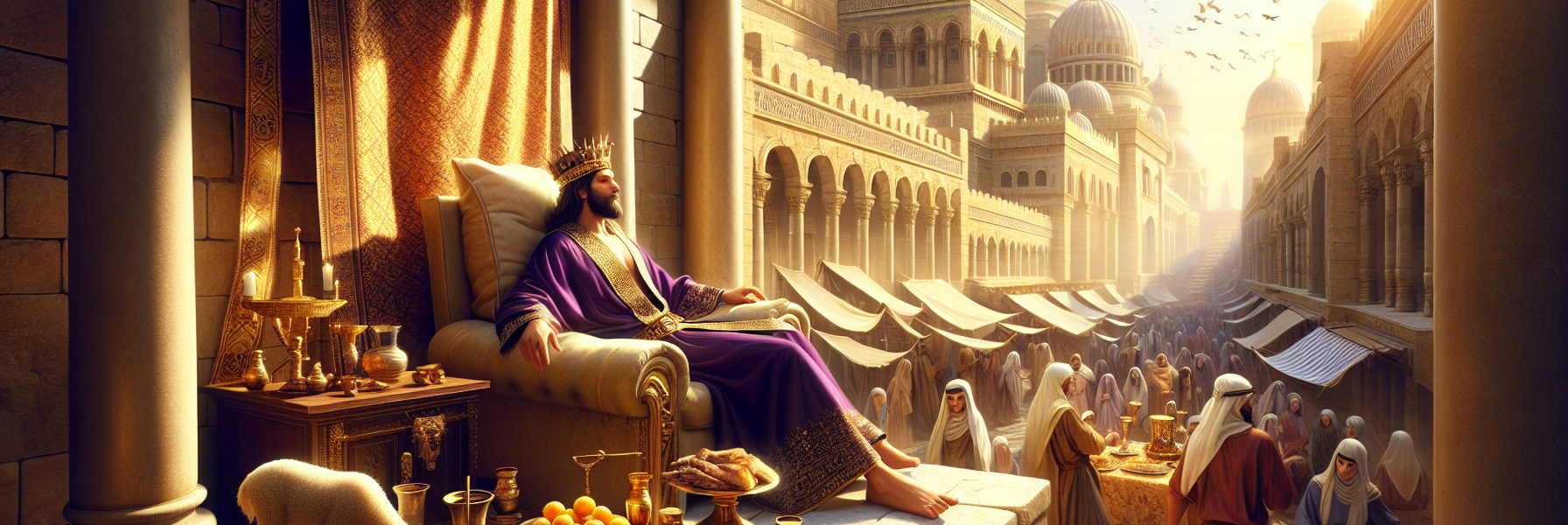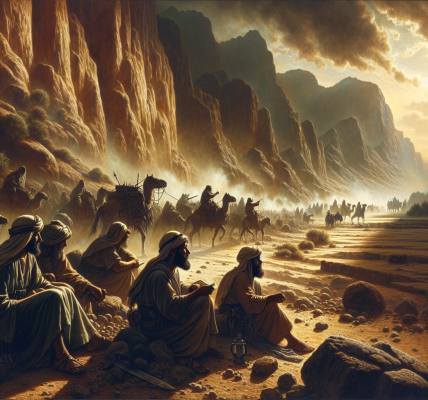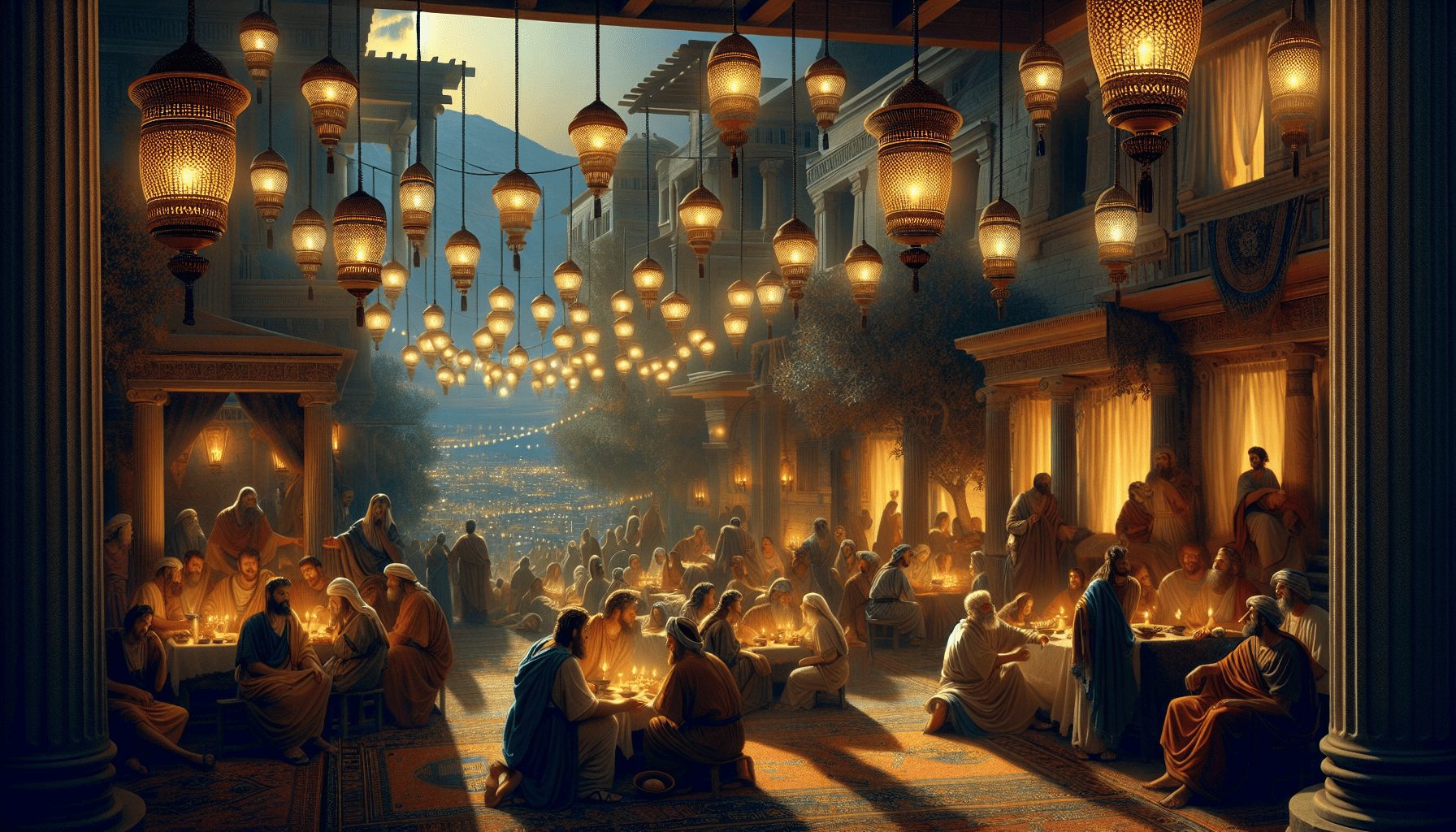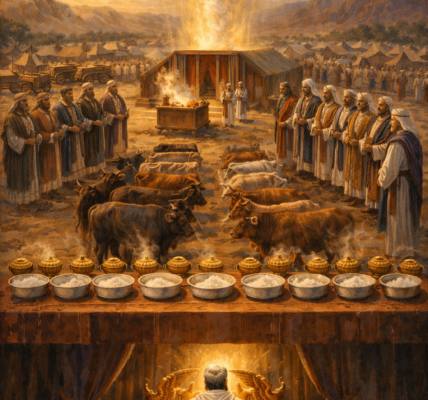**The Fall of Pride: A Story from Amos 6**
The sun blazed over the city of Zion, casting golden light upon the marble palaces and grand houses of the wealthy. The streets bustled with merchants selling fine linens, spices from distant lands, and the choicest wines. In the halls of the great, laughter and music echoed as the leaders of Israel reclined on couches inlaid with ivory, their cups never empty, their tables groaning under the weight of roasted lambs and honeyed delicacies.
Among them was a man named Shebna, a noble of Samaria, whose wealth was known throughout the land. His robes were of the finest purple, his fingers adorned with rings of gold. Each morning, he lounged upon his ivory bed, dismissing the troubles of the poor with a wave of his hand. “Why should I concern myself with the cries of the needy?” he would say to his companions. “We are the mighty of Israel, chosen by God. Surely He delights in our prosperity.”
His friend Eliab, a wealthy landowner, nodded in agreement, sipping from a jeweled goblet. “Let the prophets warn of doom if they must. We are secure in our strength. Does not Mount Samaria stand firm? Who can topple us?”
Yet, beyond their gilded halls, the land groaned under injustice. The poor sold themselves for a pair of sandals, the righteous were silenced, and the courts took bribes. The prophets had spoken, but their words were drowned out by the sound of harps and the clinking of wine cups.
Then, one evening, as the nobles feasted, a stranger appeared at the gates of Shebna’s house. His cloak was rough, his face weathered by the sun. The guards moved to drive him away, but the man’s voice carried like thunder.
“Hear the word of the Lord, you who are at ease in Zion! You who feel secure on Mount Samaria—you great men, foremost among nations, to whom the people come!”
Shebna, irritated by the interruption, stepped onto his balcony. “Who dares disturb our peace?”
The prophet’s eyes burned with divine fire. “Woe to you who lie on beds of ivory and stretch yourselves upon your couches! You eat the choicest lambs and calves, you sing idle songs to the sound of the harp, you drink wine by the bowlful—yet you do not grieve over the ruin of Joseph!”
Eliab scoffed. “What ruin? Look around you! We flourish!”
The prophet’s voice grew sharper. “Therefore, you shall be the first to go into exile! Your feasting and lounging shall end! Behold, the Lord is raising up a nation against you, O house of Israel, and they shall oppress you from the entrance of Hamath to the Valley of the Arabah!”
Laughter erupted from the nobles. “A nation against us? We have chariots and armies! Let him babble on—more wine!”
But the prophet was not finished. “You turn justice into poison and righteousness into bitterness. You rejoice in Lo-Debar and Karnaim, saying, ‘Have we not taken these cities by our own strength?’ Yet the Lord declares: I will stir up a nation against you, and they shall crush you as a wagon crushes the grain!”
Days turned to weeks, and the nobles forgot the prophet’s words. But then, whispers came from the north—an army was marching, swift and merciless. The Assyrians, fierce and unrelenting, swept through the land like a storm. The mighty walls of Samaria shook under the siege. The storehouses of wine were drained in desperation, but no amount of wealth could stop the tide of judgment.
Shebna, his fine robes now torn, huddled in his collapsing palace. The once-proud noble trembled as the enemy broke through the gates. The ivory beds were shattered, the feasting halls burned. The first to be dragged away in chains were the leaders—those who had trusted in their own strength and ignored the cries of the oppressed.
As the exile began, Shebna remembered the prophet’s words too late. “We should have listened,” he whispered, but the time for repentance had passed. The Lord had spoken, and His judgment was sure.
And so, the pride of Zion was brought low, for the Lord hates arrogance but gives grace to the humble.
**The End.**




